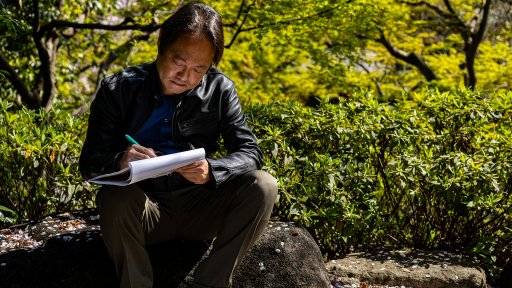By Scott Yoo

The premise of the fourth episode of Now Hear This was to document the compositional process of a complete beginner. What difficulties would a novice encounter? How would one even start to write a piece of music? In a bizarre coincidence, while (Now Hear This producer) Harry Lynch and I were planning the season, my friend and Festival Mozaic patron Patricia Kohlen commissioned me to write some chamber music!
Truth is, over a year later I am still furiously writing the piece of music that I was writing on the episode of Now Hear This. It is easily the most difficult thing I have ever tried to do. I told my neighbor Don that it is somewhat akin to giving someone a canvas, a brush, and some oils, and telling them: “ok, paint.”
Half of the reason it has taken me so long to write this piece is that I’ve spent the time not composing, but learning how to compose. I feel that only now I am beginning to understand what it means to sit down at the desk and compose. For those of you who are interested in composition, here’s what I have learned in the last 18 months:
1) Respect yourself for trying
There was a notable scene in “The Wire” when Cutty, brilliantly played by Chad Coleman, instructs his young boxing pupils that “any man still standing at the end of a round, you can’t call them soft. That’s a rule.” Likewise, anyone who has the courage to write down notes to create music is also not “soft.” They deserve respect. That means you—if you’re sitting down to write a piece of music, you’re about to embark on a difficult, frustrating, and hopefully rewarding journey—which is worthy of respect as well!
2) Don’t try to hit a 6-run home run
Terry Francona, the soon-to-be Hall of Fame baseball manager, often told his players to not try to hit a “six-run home run” when behind. When I first started writing, I tried to write an entire movement at once. I’m sure Mozart could do that, but he of course was extraordinarily smart and singularly talented.
For the rest of us, slow and steady is the only way to go.
This week I’ve been working on the fourth movement of my piece. It took two days to write the introduction. I’ve been wrestling with the A section for the past four. (The form of the movement will be introduction-A-B-A-C-A-coda.) It feels glacial, but at this pace I might be able to finish the movement by the end of the month—not too bad.
3) Don’t worry about being original—yet
Probably 90% of my time composing has been spent hitting the backspace key. No—that is Ravel. Don’t write that—that’s Bruckner. Nope, that’s Shostakovich. Sibelius.
Composition became far easier when I just write it down, original or not. Some passages did sound like Prokofiev. But after revising and revising, they started sounding like my own.
We are all a product of our environment, of what we’ve already been exposed to. It is impossible not to be swayed by what we’ve already performed, so why not accept it—embrace it, and learn from our extraordinary predecessors.
4) It’s like hearing your own voice
Remember hearing your voice on an iPhone video, or on a voicemail? Sounds awful, right?
I’m starting to think that the same applies to one’s own music. I remember the first time I heard a snippet of my music (and on-camera, no less)—I have never experienced a more cringeworthy moment. Watching the episode now and hearing my Piano Quartet: Is it a masterpiece? Of course not! But it isn’t horrible either, certainly not deserving of the self-loathing I felt while filming that scene. When I write music now, I trust that it sounds worse to me than to everyone else. It is a small comfort, but comforting nonetheless!



